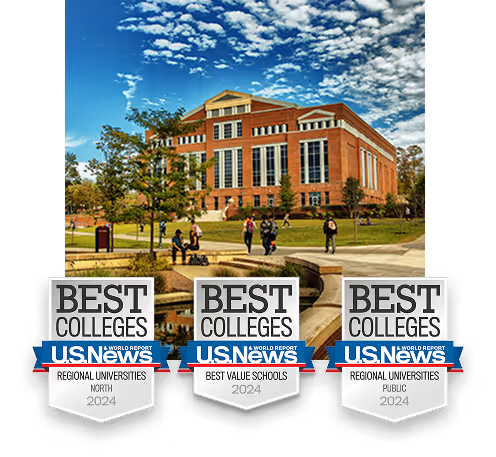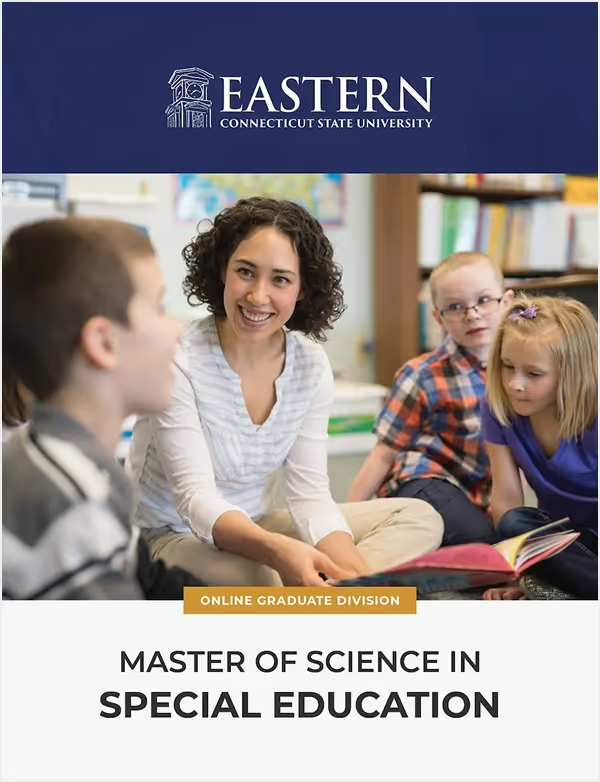



With a nationwide shortage of passionate, qualified special education professionals, some of the most vulnerable students are left without the support they require and deserve. An M.S. in Special Education degree can set you on the path to helping those who need you most.
As of 2023, the number of students receiving services under IDEA totals 7.5 million (15% of total public school students)**. Nationally, every state is struggling with a teacher shortage, a gap that ultimately leaves diverse learners without the support they need and deserve.
Eastern’s M.S. Degree in Special Education features a holistic curriculum designed for professionals with an interest in working with students with disabilities or those who already do and want to hone their skills and knowledge. Coursework emphasizes instructional methods, equipping you to design assessments and apply best practices for exceptional learners. You’ll also build collaboration skills to engage families, colleagues, and agencies effectively, and gain the expertise to advocate for inclusive education through a deeper understanding of current trends and policies.
The program offers two flexible paths of study: a cross-endorsement track for those already holding teaching certification, and a new option for individuals without certification but with relevant teaching experience who are interested in expanding into special education.
**Source: National Center for Education Statistics, Institute of Education Sciences, Students With Disabilities, on the internet at https://nces.ed.gov/programs/coe/indicator/cgg (visited June 24, 2024).
Build a strong understanding of special education laws, policies, and learner development. Learn to plan for diverse environments, design effective instruction, and uphold professional responsibility to support students with unique needs.
Apply knowledge of disabilities and interventions to design curriculum, guide referral processes, and implement teaching strategies. Strengthen your ability to adapt lessons and create research-based solutions that foster student success.
Develop the skills to evaluate students, analyze group and individual data, and plan effective programs. Learn to integrate interventions that support learners with disabilities as well as those from culturally and linguistically diverse backgrounds.
Explore evidence-based behavior management, build inclusive communities, and collaborate with families, professionals, and agencies. Gain the tools to support equity, belonging, and success for students across diverse settings.
The M.S. in Special Education is an advanced degree for experienced certified teachers, teacher candidates who have completed a teaching certification program, or other professionals with an interest in working with exceptional students.
This program is well-suited for educators and school personnel with classroom experience, working professionals who want to better serve students with disabilities, and non-certified teachers seeking to support children and youth with exceptional needs.
The Individuals with Disabilities Education Act (IDEA, 1975) mandates the provision of free and appropriate public school education for students ages 3 to 21 who meet eligibility requirements. The number of students receiving services under IDEA continues to trend upwards, showing a growing need for qualified, dedicated special education professionals.
Connecticut is also seeing a statewide shortage of qualified Prek-12 special Program manager or director educators, which is projected to continue into the coming years.*** Eastern’s program seeks to address this shortage by robustly preparing professionals for certification in K-12 settings.
***Source: Connecticut State Department of Education, Shortage Areas, on the internet at https://portal.ct.gov/SDE/Talent_Office/Talent-Office-home-page/Shortage-Areas (visited August 3, 2023).

Dr. Lee’s research foci include parent-mediated, social communication interventions for children with autism and embedded assistive technology instruction in early childhood teacher education. His research has been published and presented globally. He earned both his Ph.D. and M.S.Ed. in Special Education from Indiana University-Bloomington.

Fill out the form to receive a
M.S. Degree in Special Education Program Guide.

*You must enroll with full-time status with no breaks in attendance to complete this program in 18 months. Full-time status may vary based on the program and term. This timeline may vary depending on your individual circumstances and course availability.